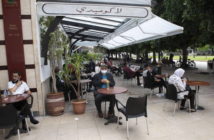The Swiss Federal Council has decided to keep the current entry ban for third-country residents in place until July 20, despite a recommendation of the European Union Council to the Member States and the Schengen Associated Countries to reopen borders on July 1.
The Swiss authorities have, however, decided to comply with the recommendation of the EU Council to reopen the borders to those countries listed as ‘safe’, leaving out only Serbia, upon an evaluation that the latter does not meet the standards for its residents to be able to enter Switzerland.
“On July 20, the Federal Department of Justice and Police FDJP intends to remove Algeria, Australia, Canada, Georgia, Japan, Morocco, New Zealand, Rwanda, South Korea, Thailand, Tunisia and Uruguay and the EU states outside the Schengen area (Bulgaria, Ireland, Croatia, Romania and Cyprus) from the list of high-risk countries,” a press release of the Federal Council reads.
It also notes that China is expected to be removed from the list too according to the EU recommendations, given that it does not permit travellers from Switzerland to enter its territory.
The decision to postpone the reopening of borders for third-country residents has been taken mostly due to the view of the increasing volume of people travelling and the rising number of new infections in Switzerland since mid-June.
On June 30, the EU Council recommended to the Member States and the Schengen Associated Countries to reopen borders on July 1 to third-country residents. The list, which is not legally binding, will be updated every fortnight.
While the majority of EU and Schengen Countries have still not announced their individual lists of countries, the residents of which can enter their territory, some of them have published narrowed-down lists. Spain, for example, has excluded China and Morocco, while the Czech Republic has decided to grant with permitted entry the residents of 8 out of the 15 countries recommended by the EU Council.
At the same time, Germany has granted with entry only 11 countries, leaving out four others.
Switzerland to Quarantine Travellers from Certain Areas
Throughout the same meeting, the Swiss Federal Council has also decided that starting from June 6, travellers entering Switzerland from certain regions will have to go into quarantine for ten days.
“The FOPH has a list of the countries concerned, which it updates regularly. Travellers affected will be notified during the flight, on board coaches and at border crossings. They will have to register with the cantonal authorities on arrival. The new ordinance will be adopted and published tomorrow. Airlines and travel companies will also be instructed not to transport sick passengers,” the Council explains.
The decision has been taken upon an increase in the number of new cases of coronavirus in Switzerland as infected persons have entered the country from countries within the Schengen area and from non-Schengen countries.







